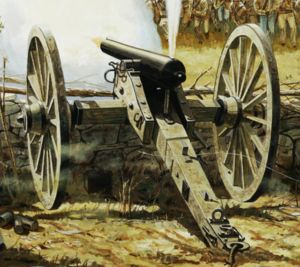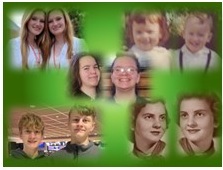By Roger and Marcia Eaton, grandson*
*Relation to Andy and/or Flora Lehr
Some call it fate, others call it destiny. To some, it is just being in the right place at the right time – or the wrong place at the wrong time. Unexpected circumstances can make a person famous or infamous in the blink of an eye.
Allen James Elmore Frazer was the son of Thomas and Elizabeth (Bricker) Frazer. He was born on April 27, 1850. The 1850 census indicates that he lived in Gettysburg, Pennsylvania.
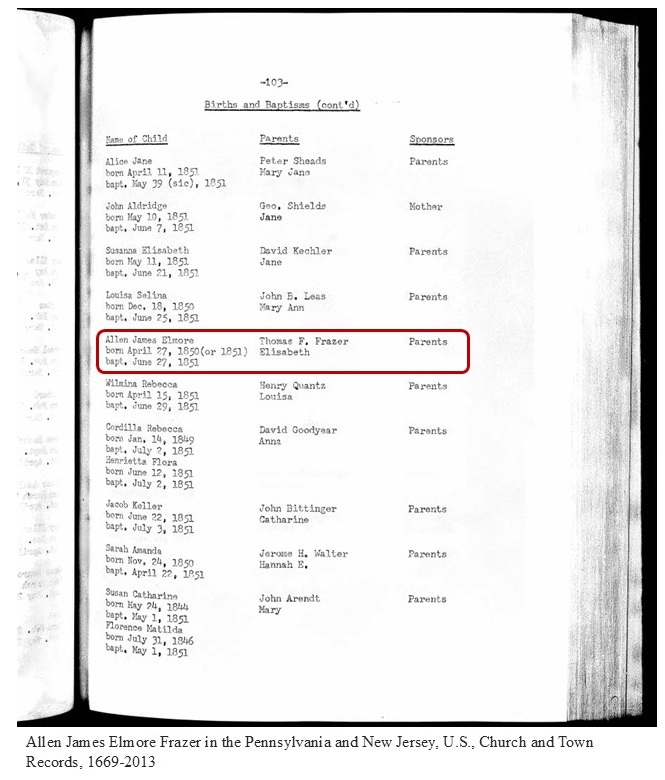
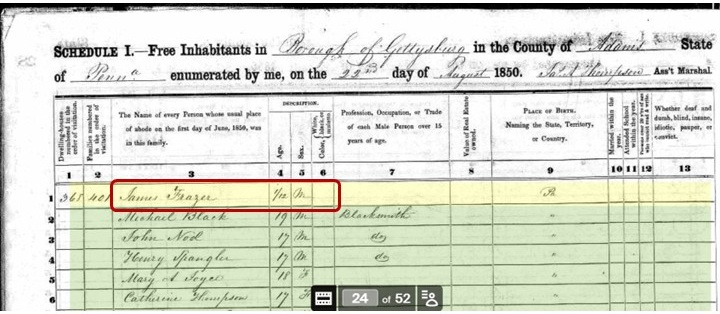
Allen was Caroline Berkley’s cousin, although they never met. Caroline’s mother, Ellen Frazer, was Allen’s aunt.
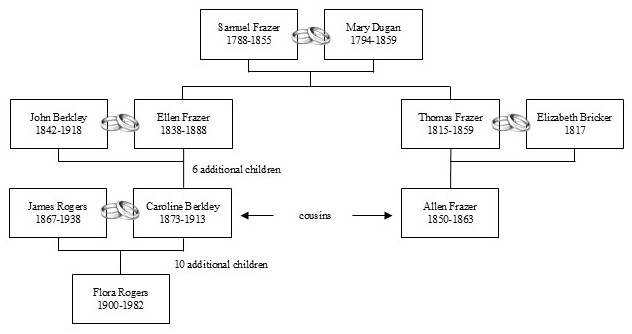
The 1860 census includes his Aunt Ellen with the Frazer household in Gettysburg. She was Carrie Berkley’s mother and Flora Roger’s grandmother.
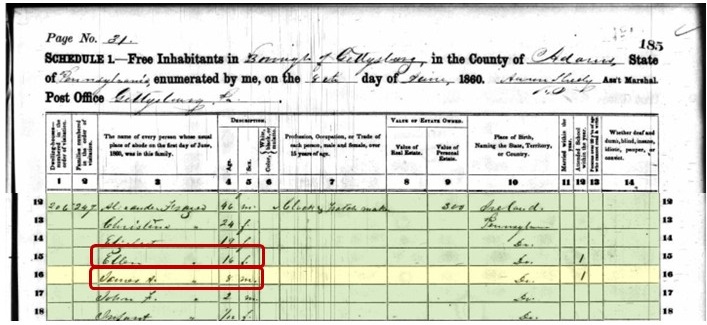
Allen’s father, Thomas, was a cabinet and furniture maker. He operated a workshop in Gettysburg.
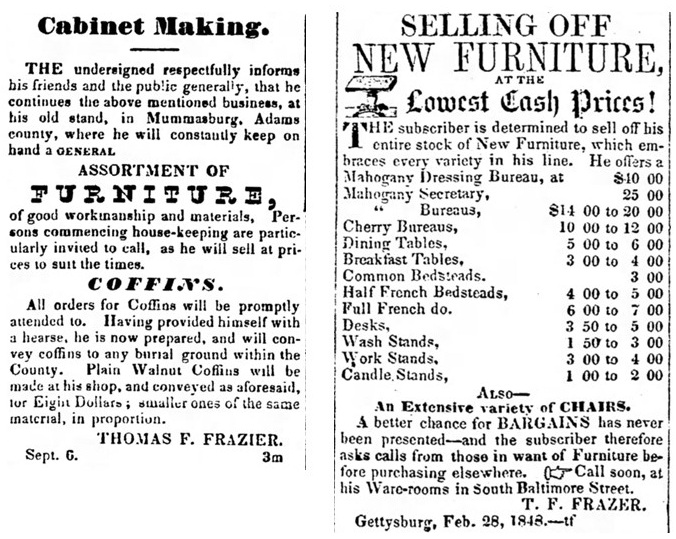
His father’s cabinet shop was near Power’s Stone Yard – owned by Solomon Powers. Solomon Powers was a highly regarded stone cutter. At his peak, his operation included sixteen apprentices. Some of the apprentices lived with Mr. and Mrs. Powers and their five daughters. He was generous, especially in feeding all the apprentices and others in the community. Each apprentice was expected to consume one pound of meat at dinner.
Thomas’ business was devasted during the panic of 1857 and his properties were sold at a sheriff sale in 1858. The family moved to Baltimore, Maryland, where they had relatives.
A year later, his father, Thomas Frazer, passed away from Typhoid Fever, Allen was nine years old. He was sent back to Gettysburg to become a stonecutter apprentice with Solomon Powers.
On September 17, 1787, one of the nation’s founders, Benjamin Franklin, responded to the question: “Well, Doctor, what have we got, a republic or monarchy?”
His response was, “A republic, if you can keep it.”
Seventy years later, in the mid-1800s, the United States of America was becoming less united. Differences between the northern and southern states escalated into a civil war. The fragile experiment of a democratic republic was failing. It is estimated that 750,000 people died during the United States Civil War. The war lasted from 1861 until 1865.
Unknowingly, Allen found himself in the crosshairs of history. Gettysburg was about to become ground zero of the Civil War.
The battle of Gettysburg, Pennsylvania, in July of 1863, has been considered a turning point in the war. Within three days, casualties exceeded 50,000. The battle provided the Union (northern states) army with a victory that crushed the momentum of the Confederate (southern states) army.
Fallen soldiers were buried in a newly established cemetery. Some remains were waiting to be collected by relatives. The odor of decaying bodies was ever-present. In some situations, the remains were exhumed for transfer to other cemeteries.
In November of 1863, President Abraham Lincoln paid a formal visit to Gettysburg to dedicate the newly created cemetery. His speech became known as the Gettysburg Address. In contrast to lengthy speeches of the time, the Gettysburg Address was only 271 words in length and was delivered in less than two minutes. That was due to President Lincoln’s ill health. He had contracted a mild case of smallpox prior to traveling to Gettysburg. This powerful collection of words became as famous as the pivotal battle.
Four score and seven years ago our fathers brought forth on this continent, a new nation, conceived in Liberty, and dedicated to the proposition that all men are created equal.
Now we are engaged in a great civil war, testing whether that nation, or any nation so conceived and so dedicated, can long endure. We are met on a great battle-field of that war. We have come to dedicate a portion of that field, as a final resting place for those who here gave their lives that that nation might live. It is altogether fitting and proper that we should do this.
But, in a larger sense, we can not dedicate—we can not consecrate—we can not hallow—this ground. The brave men, living and dead, who struggled here, have consecrated it, far above our poor power to add or detract. The world will little note, nor long remember what we say here, but it can never forget what they did here. It is for us the living, rather, to be dedicated here to the unfinished work which they who fought here have thus far so nobly advanced. It is rather for us to be here dedicated to the great task remaining before us—that from these honored dead we take increased devotion to that cause for which they gave the last full measure of devotion—that we here highly resolve that these dead shall not have died in vain—that this nation, under God, shall have a new birth of freedom—and that government of the people, by the people, for the people, shall not perish from the earth. — Abraham Lincoln
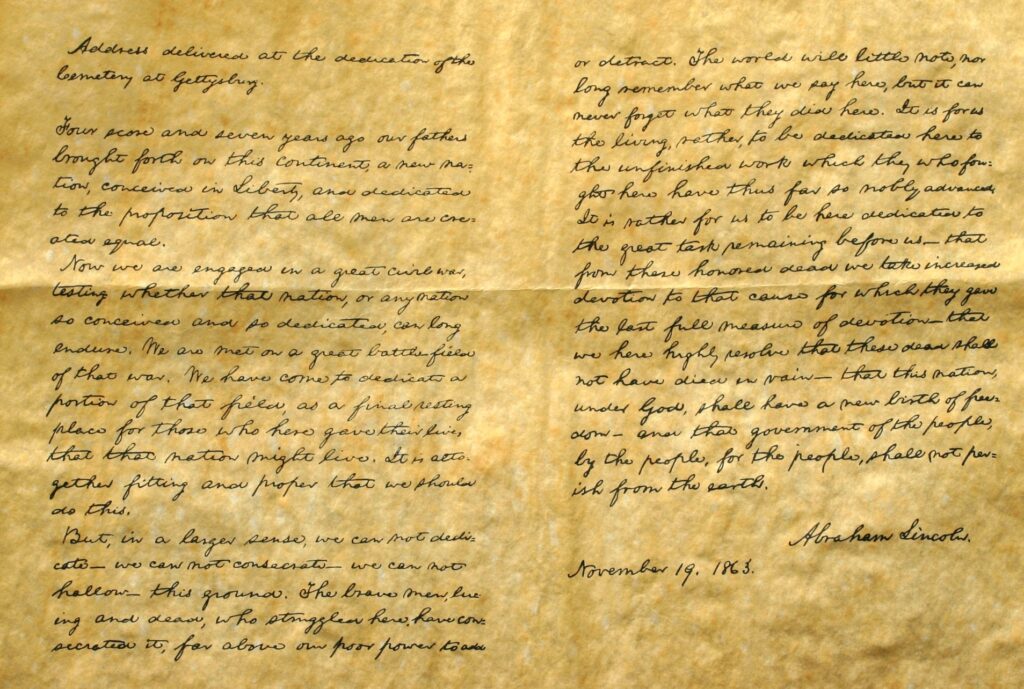
The battlefield was littered with war artifacts. That included weapons, ordinates and countless other souvenirs. Some of the ordinances were still active. There are accounts of deaths and serious injuries from unexploded ordinates. The locals quickly learned to avoid collecting battlefield souvenirs. An unexploded ordinate was found at the site of the battle in 2023.
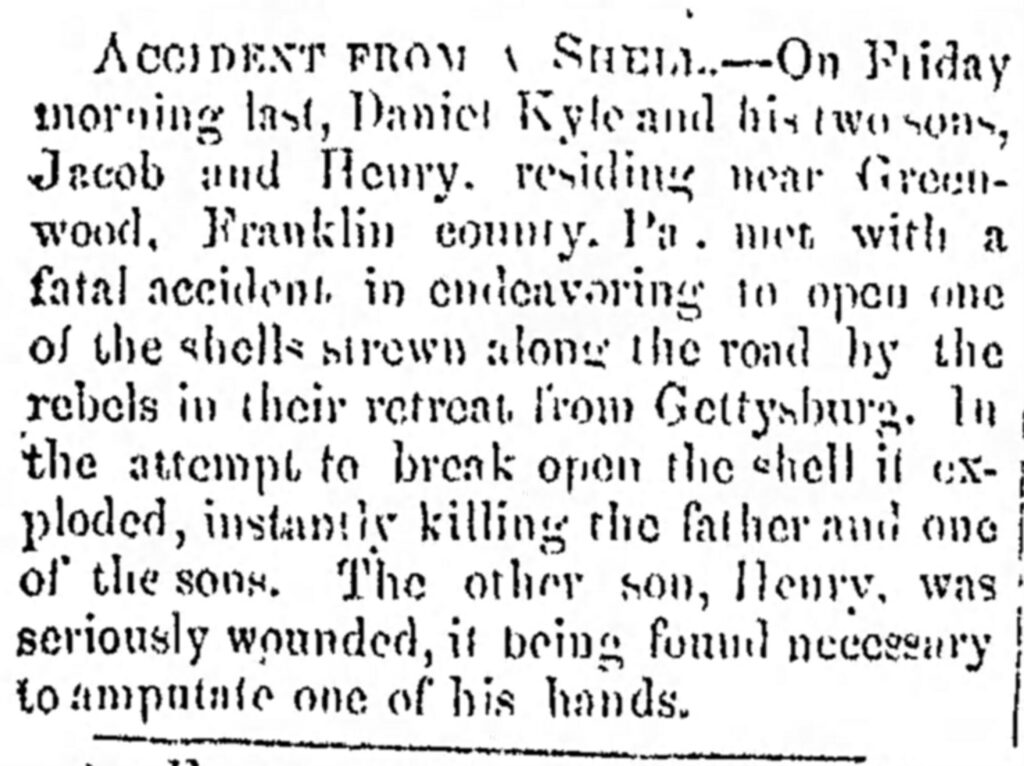
A fallen soldier’s father attended the President’s cemetery dedication. He was in Gettysburg to collect his son’s remains for transport to a Philadelphia cemetery. The casket was staged for transportation on High Street, near Solomon Powers house. While he waited for the wagon, at Powels house, he started filing on an unexploded artillery shell to remove the fuse. Not achieving success with the file, he began striking the ordinate with a stone.
Allen realized what the man was doing and approached him. As he advised the man of the danger, the ordinate exploded. The shrapnel mangled the man’s hands and nearly cut Allen in half. Allen was killed in seconds.
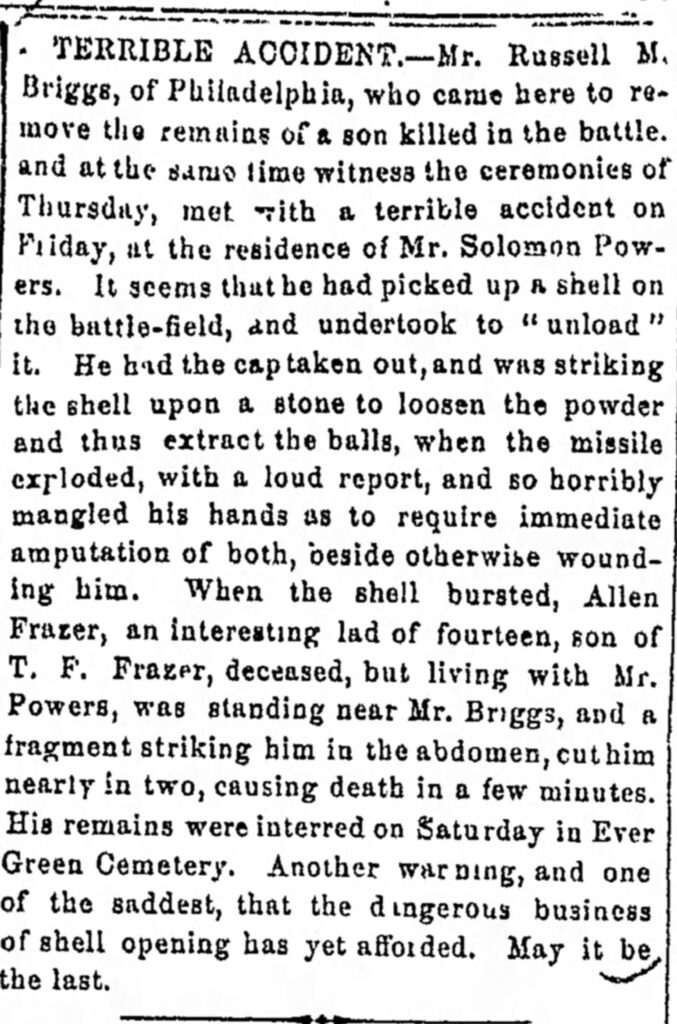
Allen was buried in the Power’s section of the Evergreen Cemetery. No headstone was placed on his grave. Some assumed that Solomon Powers anticipated that his family would have Allen’s remains moved to a cemetery of their selection.
On November 21, 2020, The Gettysburg Civil War Roundtable and other groups had a headstone place on Allen’s grave – 157 years after his death.
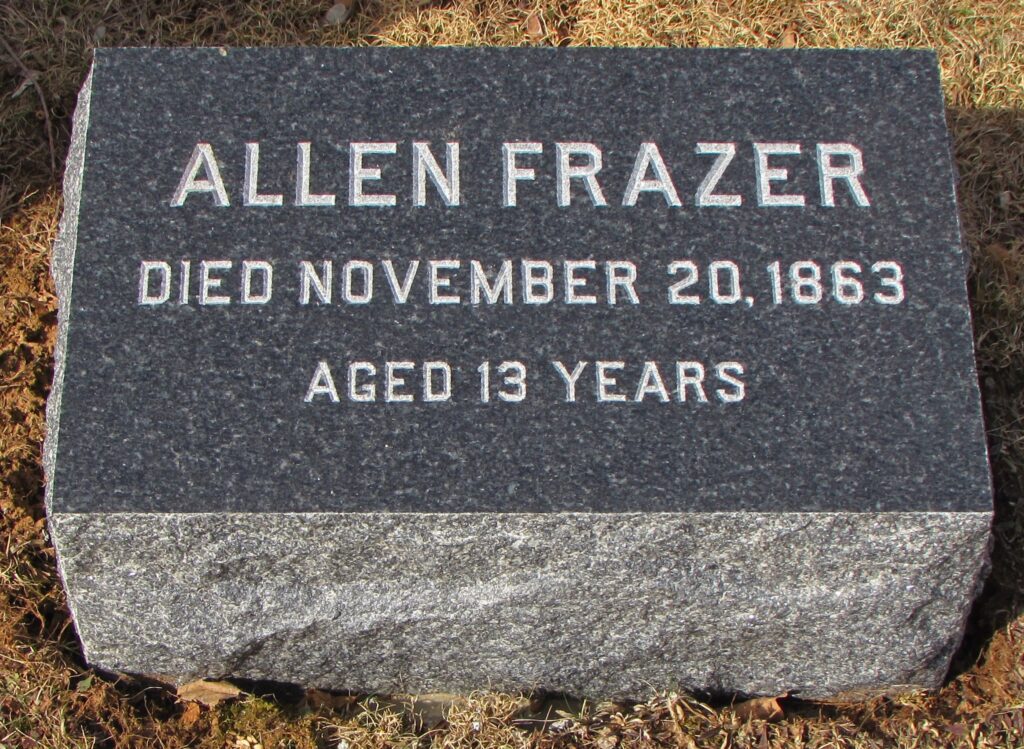
Allen Frazer Headstone Dedication
https://www.facebook.com/watch/?v=2807867322797725
Resources
The Children Killed by the Battle of Gettysburg: https://www.youtube.com/watch?v=FBg_ASlBzEU
The Casualty Four Months Later – The Gettysburg Network of 1863
The Gettysburg Network of 1863
Military Times, February 2023
National Parks Service, The Constitutional Convention: A Day-by-Day Account for September 1787
The Gettysburg Experience, Gettysburg’s Civilian Casualties
